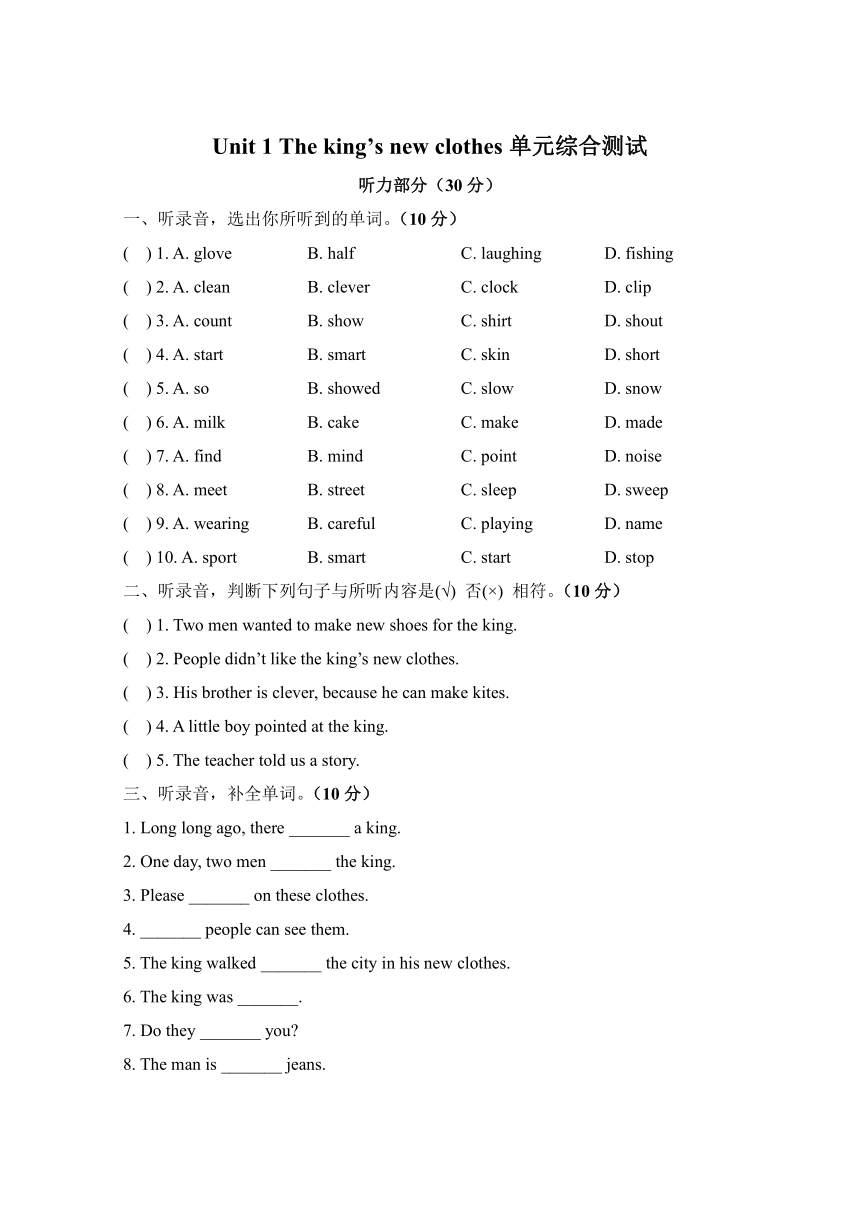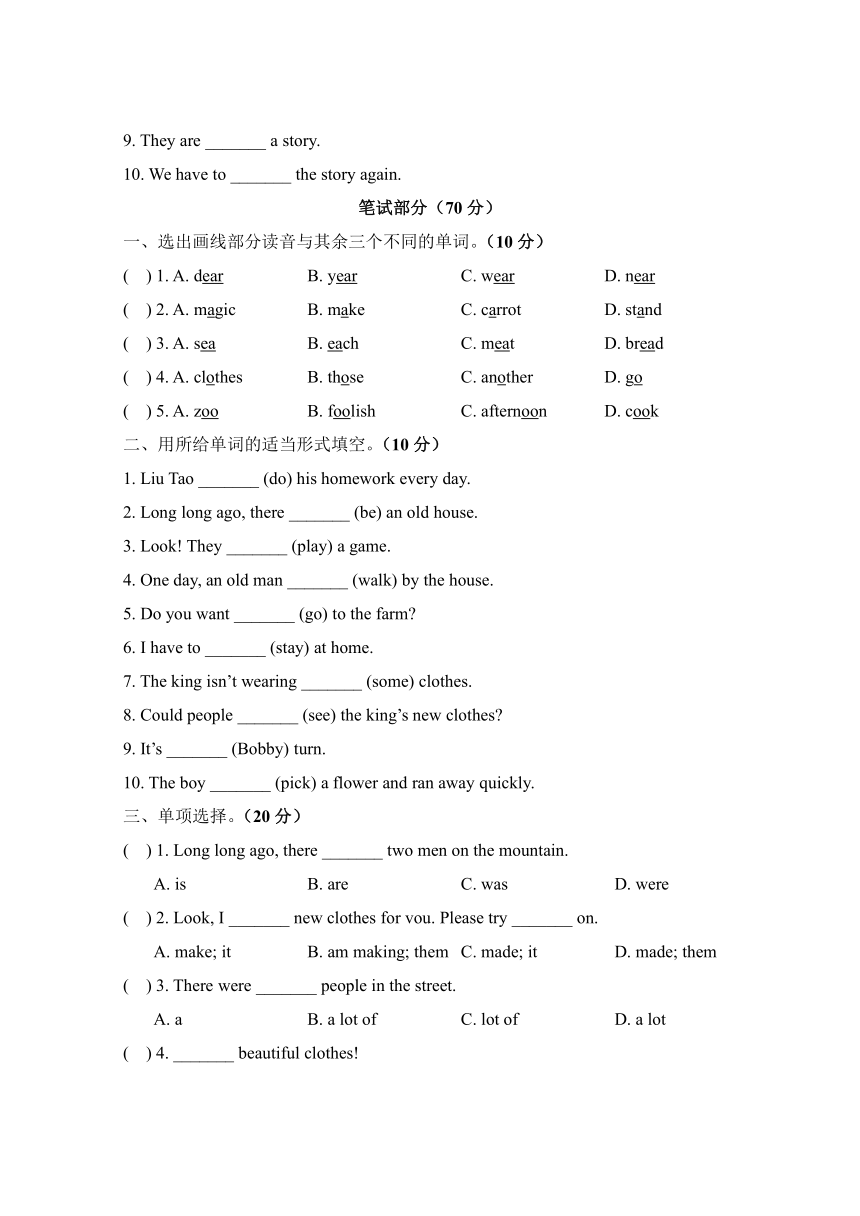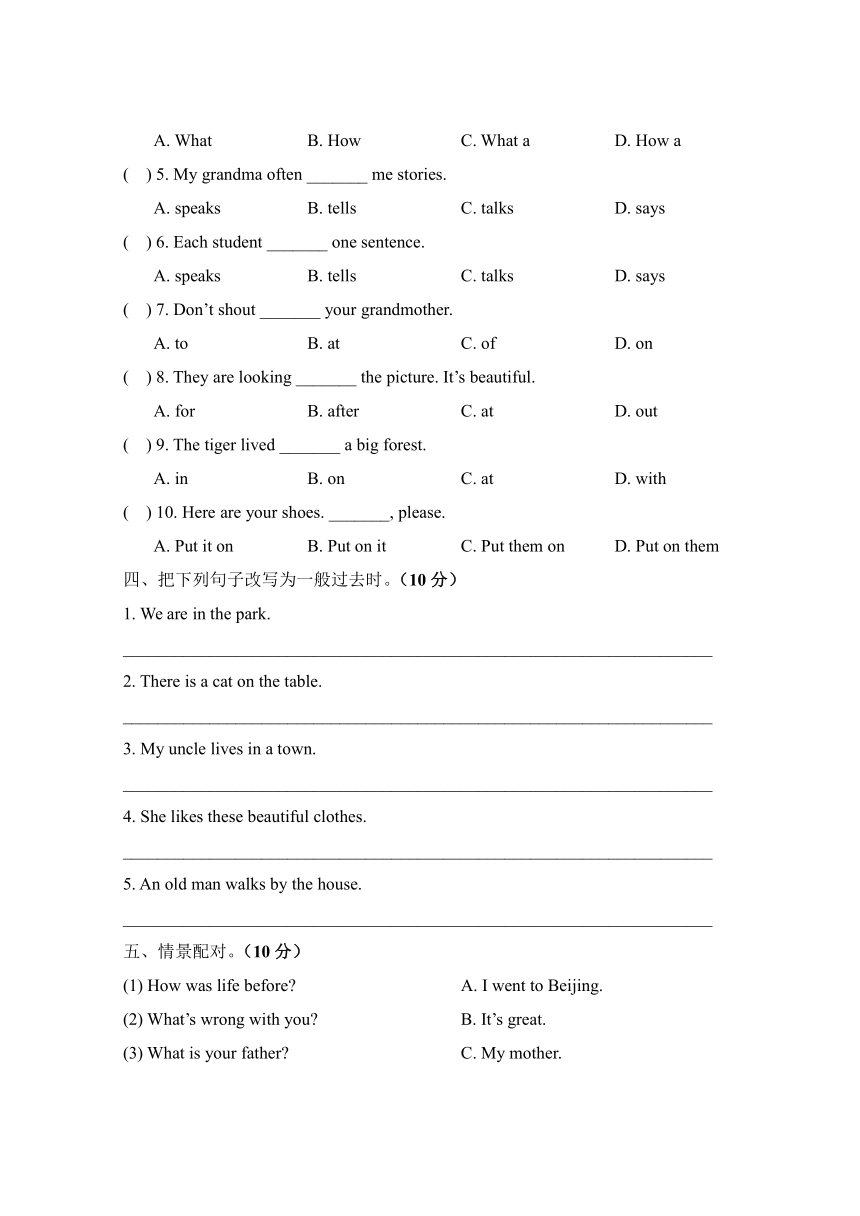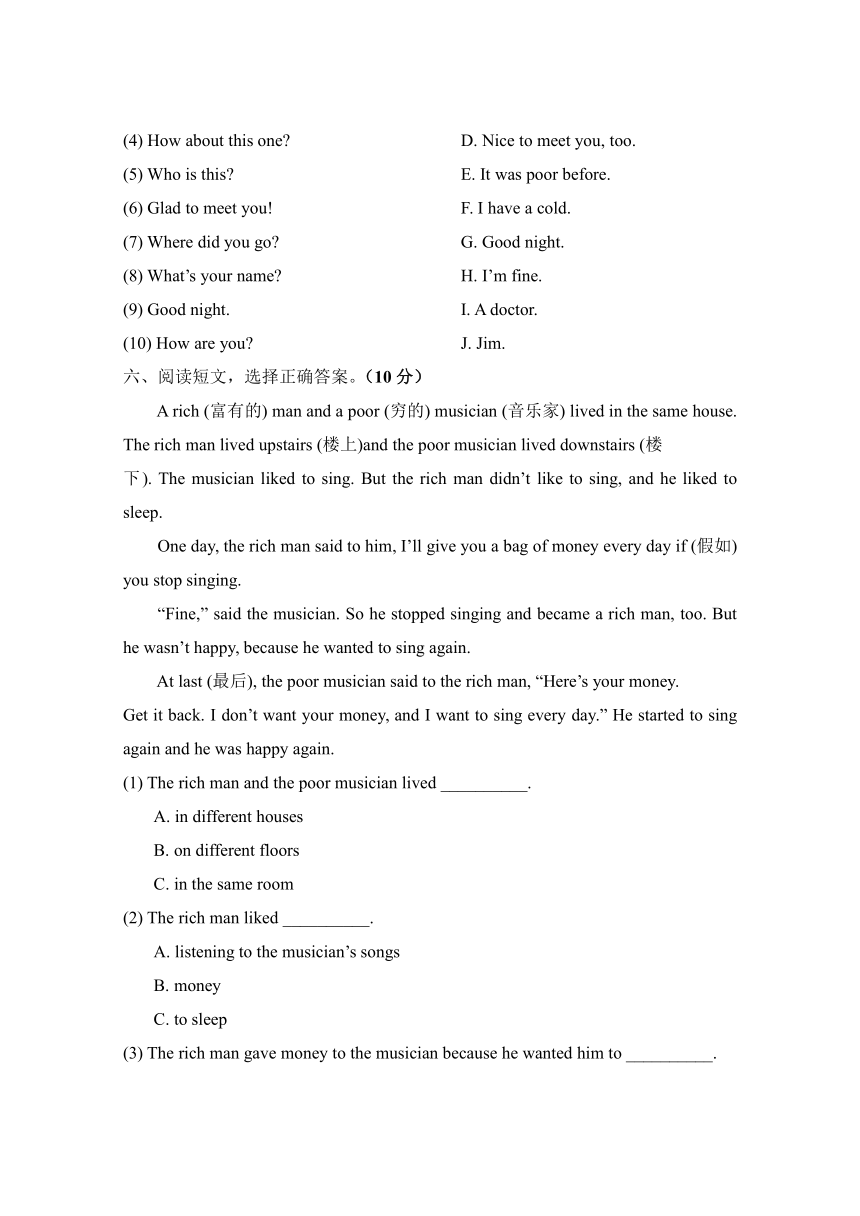Unit 1 The king’s new clothes单元测试题(含答案和听力书面材料,无听力音频)
文档属性
| 名称 | Unit 1 The king’s new clothes单元测试题(含答案和听力书面材料,无听力音频) |  | |
| 格式 | doc | ||
| 文件大小 | 49.0KB | ||
| 资源类型 | 教案 | ||
| 版本资源 | 牛津译林版 | ||
| 科目 | 英语 | ||
| 更新时间 | 2021-06-01 15:47:08 | ||
图片预览




文档简介
Unit 1 The king’s new clothes单元综合测试
听力部分(30分)
一、听录音,选出你所听到的单词。(10分)
( ) 1. A. glove B. half C. laughing D. fishing
( ) 2. A. clean B. clever C. clock D. clip
( ) 3. A. count B. show C. shirt D. shout
( ) 4. A. start B. smart C. skin D. short
( ) 5. A. so B. showed C. slow D. snow
( ) 6. A. milk B. cake C. make D. made
( ) 7. A. find B. mind C. point D. noise
( ) 8. A. meet B. street C. sleep D. sweep
( ) 9. A. wearing B. careful C. playing D. name
( ) 10. A. sport B. smart C. start D. stop
二、听录音,判断下列句子与所听内容是(√) 否(×) 相符。(10分)
( ) 1. Two men wanted to make new shoes for the king.
( ) 2. People didn’t like the king’s new clothes.
( ) 3. His brother is clever, because he can make kites.
( ) 4. A little boy pointed at the king.
( ) 5. The teacher told us a story.
三、听录音,补全单词。(10分)
1. Long long ago, there _______ a king.
2. One day, two men _______ the king.
3. Please _______ on these clothes.
4. _______ people can see them.
5. The king walked _______ the city in his new clothes.
6. The king was _______.
7. Do they _______ you?
8. The man is _______ jeans.
9. They are _______ a story.
10. We have to _______ the story again.
笔试部分(70分)
一、选出画线部分读音与其余三个不同的单词。(10分)
( ) 1. A. dear B. year C. wear D. near
( ) 2. A. magic B. make C. carrot D. stand
( ) 3. A. sea B. each C. meat D. bread
( ) 4. A. clothes B. those C. another D. go
( ) 5. A. zoo B. foolish C. afternoon D. cook
二、用所给单词的适当形式填空。(10分)
1. Liu Tao _______ (do) his homework every day.
2. Long long ago, there _______ (be) an old house.
3. Look! They _______ (play) a game.
4. One day, an old man _______ (walk) by the house.
5. Do you want _______ (go) to the farm?
6. I have to _______ (stay) at home.
7. The king isn抰 wearing _______ (some) clothes.
8. Could people _______ (see) the king抯 new clothes?
9. It抯 _______ (Bobby) turn.
10. The boy _______ (pick) a flower and ran away quickly.
三、单项选择。(20分)
( ) 1. Long long ago, there _______ two men on the mountain.
A. is B. are C. was D. were
( ) 2. Look, I _______ new clothes for vou. Please try _______ on.
A. make; it B. am making; them C. made; it D. made; them
( ) 3. There were _______ people in the street.
A. a B. a lot of C. lot of D. a lot
( ) 4. _______ beautiful clothes!
A. What B. How C. What a D. How a
( ) 5. My grandma often _______ me stories.
A. speaks B. tells C. talks D. says
( ) 6. Each student _______ one sentence.
A. speaks B. tells C. talks D. says
( ) 7. Don抰 shout _______ your grandmother.
A. to B. at C. of D. on
( ) 8. They are looking _______ the picture. It抯 beautiful.
A. for B. after C. at D. out
( ) 9. The tiger lived _______ a big forest.
A. in B. on C. at D. with
( ) 10. Here are your shoes. _______, please.
A. Put it on B. Put on it C. Put them on D. Put on them
四、把下列句子改写为一般过去时。(10分)
1. We are in the park.
____________________________________________________________________
2. There is a cat on the table.
____________________________________________________________________
3. My uncle lives in a town.
____________________________________________________________________
4. She likes these beautiful clothes.
____________________________________________________________________
5. An old man walks by the house.
____________________________________________________________________
五、情景配对。(10分)
(1) How was life before? A. I went to Beijing.
(2) What’s wrong with you? B. It’s great.
(3) What is your father? C. My mother.
(4) How about this one? D. Nice to meet you, too.
(5) Who is this? E. It was poor before.
(6) Glad to meet you! F. I have a cold.
(7) Where did you go? G. Good night.
(8) What’s your name? H. I’m fine.
(9) Good night. I. A doctor.
(10) How are you? J. Jim.
六、阅读短文,选择正确答案。(10分)
A rich (富有的) man and a poor (穷的) musician (音乐家) lived in the same house. The rich man lived upstairs (楼上)and the poor musician lived downstairs (楼
下). The musician liked to sing. But the rich man didn’t like to sing, and he liked to sleep.
One day, the rich man said to him, I’ll give you a bag of money every day if (假如) you stop singing.
“Fine,” said the musician. So he stopped singing and became a rich man, too. But he wasn’t happy, because he wanted to sing again.
At last (最后), the poor musician said to the rich man, “Here’s your money.
Get it back. I don’t want your money, and I want to sing every day.” He started to sing again and he was happy again.
(1) The rich man and the poor musician lived __________.
A. in different houses
B. on different floors
C. in the same room
(2) The rich man liked __________.
A. listening to the musician’s songs
B. money
C. to sleep
(3) The rich man gave money to the musician because he wanted him to __________.
A. stop singing
B. sing for him
C. be his good friend
(4) Did the musician want to sing again after he had a lot of money?
A. Yes, he did.
B. No, he didn’t.
C. No, he was happy.
(5) Money _______ make (使) the musician happy.
A. can
B. can’t
C. isn’t
参考答案
听力部分
听力材料
一、
1. He’s very happy. He’s laughing.
2. He’s so clever. He can mend his bike.
3. Don’t shout. The students are doing their homework.
4. Let’s start the game.
5. The two men showed the king his new clothes.
6. We can make new clothes for you.
7. Don’t point at others. That isn’t polite.
8. There were a lot of people in the street.
9. The king isn’t wearing any clothes!
10. Don’t stop.
二、
1. Two men wanted to make new clothes for the king.
2. People couldn’t see the king’s new clothes.
3. His brother is clever, because he can make kites.
4. A little boy laughed at the king.
5. The teacher told us a story.
三、
1. Long long ago, there was a king.
2. One day, two men visited the king.
3. Please try on these clothes.
4. Clever people can see them.
5. The king walked through the city in his new clothes.
6. The king was foolish.
7. Do they fit you?
8. The man is wearing jeans.
9. They are telling a story.
10. We have to start the story again.
听力答案
一、
1. C 2. B 3. D 4. A 5. B 6. C 7. C 8. B 9. A 10. D
二、
1-5 ××√×√
三、
1. was 2. visited 3. try 4. clever 5. through 6. foolish 7. fit 8. wearing 9. telling 10. start
笔试部分
一、
1-5 CBDCD
二、
1. does 2. was 3. are playing 4. walked 5. to go 6. stay 7. any 8. see 9. Bobby’s 10. picked
三、
1-10 DDBAB DBCAC
四、
1. We were in the park.
2. There was a cat on the table.
3. My uncle lived in a town.
4. She liked these beautiful clothes.
5. An old man walked by the house.
五、
(1)-(10) EFIBC DAJGH
六、
(1)-(5) BCAAB
听力部分(30分)
一、听录音,选出你所听到的单词。(10分)
( ) 1. A. glove B. half C. laughing D. fishing
( ) 2. A. clean B. clever C. clock D. clip
( ) 3. A. count B. show C. shirt D. shout
( ) 4. A. start B. smart C. skin D. short
( ) 5. A. so B. showed C. slow D. snow
( ) 6. A. milk B. cake C. make D. made
( ) 7. A. find B. mind C. point D. noise
( ) 8. A. meet B. street C. sleep D. sweep
( ) 9. A. wearing B. careful C. playing D. name
( ) 10. A. sport B. smart C. start D. stop
二、听录音,判断下列句子与所听内容是(√) 否(×) 相符。(10分)
( ) 1. Two men wanted to make new shoes for the king.
( ) 2. People didn’t like the king’s new clothes.
( ) 3. His brother is clever, because he can make kites.
( ) 4. A little boy pointed at the king.
( ) 5. The teacher told us a story.
三、听录音,补全单词。(10分)
1. Long long ago, there _______ a king.
2. One day, two men _______ the king.
3. Please _______ on these clothes.
4. _______ people can see them.
5. The king walked _______ the city in his new clothes.
6. The king was _______.
7. Do they _______ you?
8. The man is _______ jeans.
9. They are _______ a story.
10. We have to _______ the story again.
笔试部分(70分)
一、选出画线部分读音与其余三个不同的单词。(10分)
( ) 1. A. dear B. year C. wear D. near
( ) 2. A. magic B. make C. carrot D. stand
( ) 3. A. sea B. each C. meat D. bread
( ) 4. A. clothes B. those C. another D. go
( ) 5. A. zoo B. foolish C. afternoon D. cook
二、用所给单词的适当形式填空。(10分)
1. Liu Tao _______ (do) his homework every day.
2. Long long ago, there _______ (be) an old house.
3. Look! They _______ (play) a game.
4. One day, an old man _______ (walk) by the house.
5. Do you want _______ (go) to the farm?
6. I have to _______ (stay) at home.
7. The king isn抰 wearing _______ (some) clothes.
8. Could people _______ (see) the king抯 new clothes?
9. It抯 _______ (Bobby) turn.
10. The boy _______ (pick) a flower and ran away quickly.
三、单项选择。(20分)
( ) 1. Long long ago, there _______ two men on the mountain.
A. is B. are C. was D. were
( ) 2. Look, I _______ new clothes for vou. Please try _______ on.
A. make; it B. am making; them C. made; it D. made; them
( ) 3. There were _______ people in the street.
A. a B. a lot of C. lot of D. a lot
( ) 4. _______ beautiful clothes!
A. What B. How C. What a D. How a
( ) 5. My grandma often _______ me stories.
A. speaks B. tells C. talks D. says
( ) 6. Each student _______ one sentence.
A. speaks B. tells C. talks D. says
( ) 7. Don抰 shout _______ your grandmother.
A. to B. at C. of D. on
( ) 8. They are looking _______ the picture. It抯 beautiful.
A. for B. after C. at D. out
( ) 9. The tiger lived _______ a big forest.
A. in B. on C. at D. with
( ) 10. Here are your shoes. _______, please.
A. Put it on B. Put on it C. Put them on D. Put on them
四、把下列句子改写为一般过去时。(10分)
1. We are in the park.
____________________________________________________________________
2. There is a cat on the table.
____________________________________________________________________
3. My uncle lives in a town.
____________________________________________________________________
4. She likes these beautiful clothes.
____________________________________________________________________
5. An old man walks by the house.
____________________________________________________________________
五、情景配对。(10分)
(1) How was life before? A. I went to Beijing.
(2) What’s wrong with you? B. It’s great.
(3) What is your father? C. My mother.
(4) How about this one? D. Nice to meet you, too.
(5) Who is this? E. It was poor before.
(6) Glad to meet you! F. I have a cold.
(7) Where did you go? G. Good night.
(8) What’s your name? H. I’m fine.
(9) Good night. I. A doctor.
(10) How are you? J. Jim.
六、阅读短文,选择正确答案。(10分)
A rich (富有的) man and a poor (穷的) musician (音乐家) lived in the same house. The rich man lived upstairs (楼上)and the poor musician lived downstairs (楼
下). The musician liked to sing. But the rich man didn’t like to sing, and he liked to sleep.
One day, the rich man said to him, I’ll give you a bag of money every day if (假如) you stop singing.
“Fine,” said the musician. So he stopped singing and became a rich man, too. But he wasn’t happy, because he wanted to sing again.
At last (最后), the poor musician said to the rich man, “Here’s your money.
Get it back. I don’t want your money, and I want to sing every day.” He started to sing again and he was happy again.
(1) The rich man and the poor musician lived __________.
A. in different houses
B. on different floors
C. in the same room
(2) The rich man liked __________.
A. listening to the musician’s songs
B. money
C. to sleep
(3) The rich man gave money to the musician because he wanted him to __________.
A. stop singing
B. sing for him
C. be his good friend
(4) Did the musician want to sing again after he had a lot of money?
A. Yes, he did.
B. No, he didn’t.
C. No, he was happy.
(5) Money _______ make (使) the musician happy.
A. can
B. can’t
C. isn’t
参考答案
听力部分
听力材料
一、
1. He’s very happy. He’s laughing.
2. He’s so clever. He can mend his bike.
3. Don’t shout. The students are doing their homework.
4. Let’s start the game.
5. The two men showed the king his new clothes.
6. We can make new clothes for you.
7. Don’t point at others. That isn’t polite.
8. There were a lot of people in the street.
9. The king isn’t wearing any clothes!
10. Don’t stop.
二、
1. Two men wanted to make new clothes for the king.
2. People couldn’t see the king’s new clothes.
3. His brother is clever, because he can make kites.
4. A little boy laughed at the king.
5. The teacher told us a story.
三、
1. Long long ago, there was a king.
2. One day, two men visited the king.
3. Please try on these clothes.
4. Clever people can see them.
5. The king walked through the city in his new clothes.
6. The king was foolish.
7. Do they fit you?
8. The man is wearing jeans.
9. They are telling a story.
10. We have to start the story again.
听力答案
一、
1. C 2. B 3. D 4. A 5. B 6. C 7. C 8. B 9. A 10. D
二、
1-5 ××√×√
三、
1. was 2. visited 3. try 4. clever 5. through 6. foolish 7. fit 8. wearing 9. telling 10. start
笔试部分
一、
1-5 CBDCD
二、
1. does 2. was 3. are playing 4. walked 5. to go 6. stay 7. any 8. see 9. Bobby’s 10. picked
三、
1-10 DDBAB DBCAC
四、
1. We were in the park.
2. There was a cat on the table.
3. My uncle lived in a town.
4. She liked these beautiful clothes.
5. An old man walked by the house.
五、
(1)-(10) EFIBC DAJGH
六、
(1)-(5) BCAAB
